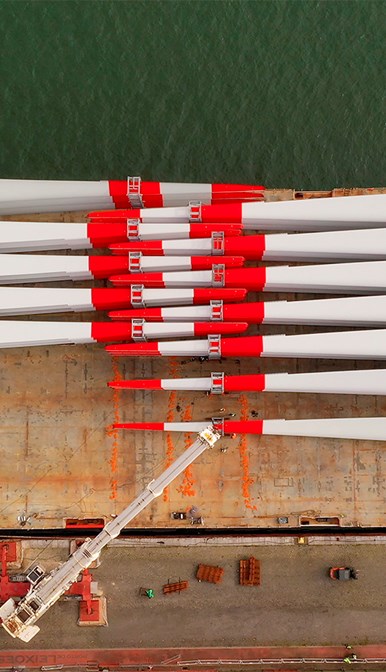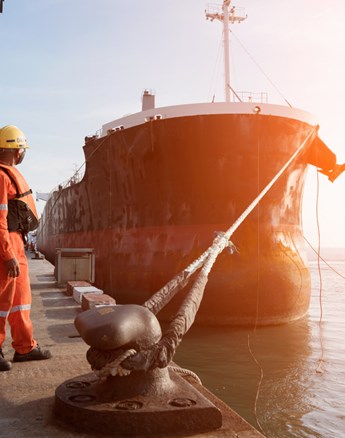Decarbonization and Energy Transition
The current climate crisis has sensitized companies to a more sustainable business model. The European Union aims to make Europe more climate neutral by 2050 by implementing the (European) Green Deal, which aims to reduce greenhouse gas emissions by 55% by 2030.
As a socially and environmentally responsible company, APDL is committed to achieving carbon neutrality by 2035 by adopting appropriate measures:
Improving the capacity of the electricity grid
Electrifying port activities
Investing in Renewable Energy Sources
Implementing Onshore Power Supply (OPS) systems
Investing in Alternative Fuels
Strengthening Digitalization
Improving Air Quality Monitoring
-
APDL encourages the use of alternative fuels with little or no environmental impact, such as biofuels and hydrogen, which is fundamental to reducing emissions from activities.
GREEN FUELS: A biofuel pilot project will be launched and other solutions will be considered, such as the supply of green fuels;
INCENTIVES: Reduced harbour dues for ships with better environmental performance;
FUEL STORAGE: such as hydrogen, ammonia and methanol, which will boost their use through the creation of refuelling facilities;
SENSORS: Monitoring charging stations and the consumption of buildings, equipment and vehicles more efficiently (Sensorisation, IoT, AI, Virtual Reality, Digital Twin).
-
APDL's commitment to climate change is geared towards boosting renewable energy sources, with the aim of producing energy for self-consumption and/or sale.
SOLAR ENERGY: plans to install photovoltaic panels on the roofs of buildings and car parks;
WIND ENERGY: two turbines are expected to be installed on the north breakwater of the port of Leixões, to produce more than 20 Gwh/year;
Wave energy: installation of a pilot float unit on the north breakwater, with 1 MW, which can be expanded to 5 MW, to produce around 18.5 GWh/year.
-
The electrification of port activities, as well as the maritime and land fleet, is a priority in order to end the use of fossil fuels, allowing for the reduction of 7,000 tonnes of CO2 per year.
ECOTRUCK: Used daily in Leixões port operations, helping to reduce the environmental footprint;
NEW GENERATION TUGS: Acquisition of 2 new generation tugs, emitting around 80 per cent less polluting gases;
ELECTRIC CARS: Acquisition of electric cars for APDL's land fleet and implementation of charging infrastructures;
TRANSPORT OF GOODS: A ban on the entry and circulation of EURO I, II, III and IV heavy goods vehicles in the Port of Leixões.
-
Improving air quality and reducing noise will benefit more than 2.4 million people in the Community. Strengthening Port/Community relations is our main objective.
ONSHORE POWER SUPPLY: This will allow ships docking at the Port of Leixões to be connected to the electricity grid, eliminating more than 38,000 tonnes of CO2 per year and significantly reducing the noise caused by auxiliary engines;
AIR QUALITY MEASUREMENT: Improvement of the existing sensor network, with specific software, to monitor pollutant emissions around the port area;
35% REDUCTION IN EMISSIONS BY 2025;
75% REDUCTION IN EMISSIONS BY 2030;
ZERO EMISSIONS BY 2035, ACHIEVING CARBON NEUTRALITY
-
The energy transition will only be possible with a high digital component, to monitor the implementation of the strategy towards carbon neutrality.
DATA CENTRE: To guarantee the security, availability and autonomy of the port's information and management, with the aim of establishing partnerships with international organisations;
5G PROJECT: This technology makes it possible to transmit more security and efficiency in port operations, as well as measuring their environmental impacts;
JUL - PORT SINGLE WINDOW: A system that will increase transparency in processes, optimise and synchronise multimodal flows, making the port more competitive;
AI - ARTIFICIAL INTELLIGENCE: Development of machine learning, enabling better results in real time;
GIIP - Intelligent Management of Port Infrastructures.BLOCKCHAIN: Will enable economic and energy savings in the port, facilitating energy exchanges between internal and external consumers or producers;
SMART GRID: Will ensure a sustainable and efficient energy system, with high levels of quality and security of supply.
Our Commitments:
Minimising the negative impacts of the activity and implementing good practices in resource management;
Ensuring the safety of people and operations;
Creating value and involving business partners in commitments to sustainability;
Optimise the company's contribution to the personal and professional development of the people who work for it;
Promoting corporate social responsibility and interaction with local communities.



